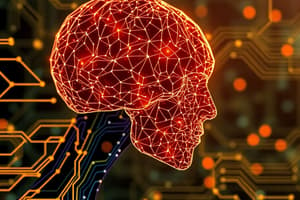Podcast
Questions and Answers
What defines Narrow AI?
What defines Narrow AI?
- AI that can perform any intellectual task that a human can.
- AI capable of understanding human emotions and behaviors.
- AI systems that surpass human intelligence in all fields.
- AI designed for specific tasks like recommendation systems. (correct)
What is a significant feature of Superintelligent AI?
What is a significant feature of Superintelligent AI?
- AI that is used solely for entertainment purposes.
- AI that possesses intelligence exceeding human abilities. (correct)
- AI that is currently in widespread use today.
- AI that can only perform simple tasks.
How does Machine Learning improve its performance?
How does Machine Learning improve its performance?
- By being constantly monitored by humans.
- By learning from data without explicit programming. (correct)
- Through manual programming for every task.
- By using pre-defined rules and guidelines.
Which of the following is NOT a key component of AI?
Which of the following is NOT a key component of AI?
What is an ethical concern associated with AI technologies?
What is an ethical concern associated with AI technologies?
What is Explainable AI focused on?
What is Explainable AI focused on?
What application area does Natural Language Processing (NLP) significantly impact?
What application area does Natural Language Processing (NLP) significantly impact?
What is a potential future trend in the field of AI?
What is a potential future trend in the field of AI?
Flashcards are hidden until you start studying
Study Notes
Definition
- Artificial Intelligence (AI) refers to the simulation of human intelligence in machines that are programmed to think and learn.
Types of AI
-
Narrow AI (Weak AI)
- Designed for specific tasks (e.g., virtual assistants, recommendation systems).
- Examples: Siri, Alexa, image recognition.
-
General AI (Strong AI)
- Hypothetical AI that possesses the ability to understand, learn, and apply intelligence across a wide range of tasks.
- Not yet realized.
-
Superintelligent AI
- A level of intelligence surpassing human capabilities in virtually every field.
- Theoretical concept with ethical implications.
Key Components
-
Machine Learning (ML)
- Subset of AI that allows systems to learn from data and improve their performance over time without being explicitly programmed.
-
Deep Learning
- A type of ML involving neural networks with many layers, used for complex tasks like image and speech recognition.
-
Natural Language Processing (NLP)
- Enables machines to understand, interpret, and respond to human language.
Applications
-
Healthcare
- Diagnostics, personalized medicine, and robotic surgery.
-
Finance
- Fraud detection, algorithmic trading, and customer service via chatbots.
-
Transportation
- Autonomous vehicles and traffic management systems.
-
Entertainment
- Content recommendation, video games, and virtual reality.
Ethical Considerations
-
Bias in AI
- AI systems can inherit biases present in training data, leading to unfair outcomes.
-
Privacy Concerns
- Collection and use of personal data raise significant privacy issues.
-
Job Displacement
- Automation may lead to job loss in certain sectors.
-
Accountability and Decision Making
- Challenges in determining responsibility for actions taken by AI systems.
Future Trends
-
Explainable AI
- Development of AI systems that provide transparency in decision-making processes.
-
AI in Everyday Life
- Increasing integration into smart homes, personal devices, and everyday tasks.
-
Regulation and Governance
- Growing focus on creating frameworks to ensure safe and ethical use of AI technologies.
Definition
- Artificial Intelligence (AI) simulates human intelligence in machines, enabling them to think, learn, and adapt.
Types of AI
- Narrow AI (Weak AI)
- Created for specific applications such as virtual assistants (e.g., Siri, Alexa) and image recognition.
- General AI (Strong AI)
- A theoretical form of AI that could understand and perform any intellectual task a human can, currently unachieved.
- Superintelligent AI
- A speculative AI surpassing human intelligence across all domains, raising significant ethical concerns.
Key Components
- Machine Learning (ML)
- A branch of AI allowing systems to learn from data autonomously and enhance their performance.
- Deep Learning
- A specialized ML type utilizing multi-layered neural networks, effective in complex tasks like image and speech recognition.
- Natural Language Processing (NLP)
- Empowers machines to interpret and interact with human language, facilitating communication.
Applications
- Healthcare
- Utilized in diagnostics, tailoring personalized medicine, and enabling robotic-assisted surgeries.
- Finance
- Employed for detecting fraud, implementing algorithmic trading, and enhancing customer service with chatbots.
- Transportation
- Integral in developing autonomous vehicles and optimizing traffic management systems.
- Entertainment
- Powers content recommendation systems, enhances gaming experiences, and creates immersive virtual realities.
Ethical Considerations
- Bias in AI
- AI can reflect biases from training data, resulting in unjust outcomes.
- Privacy Concerns
- The collection of personal data by AI systems poses significant privacy challenges.
- Job Displacement
- Automation through AI threatens job security in various industries.
- Accountability and Decision Making
- Complications arise in ascertaining responsibility for decisions made by AI entities.
Future Trends
- Explainable AI
- Aiming to create AI systems that clarify their decision-making processes.
- AI in Everyday Life
- Growing presence in smart homes and daily activities, improving efficiency and convenience.
- Regulation and Governance
- Increasing emphasis on establishing regulatory frameworks to ensure AI is ethically and safely employed.
Studying That Suits You
Use AI to generate personalized quizzes and flashcards to suit your learning preferences.




